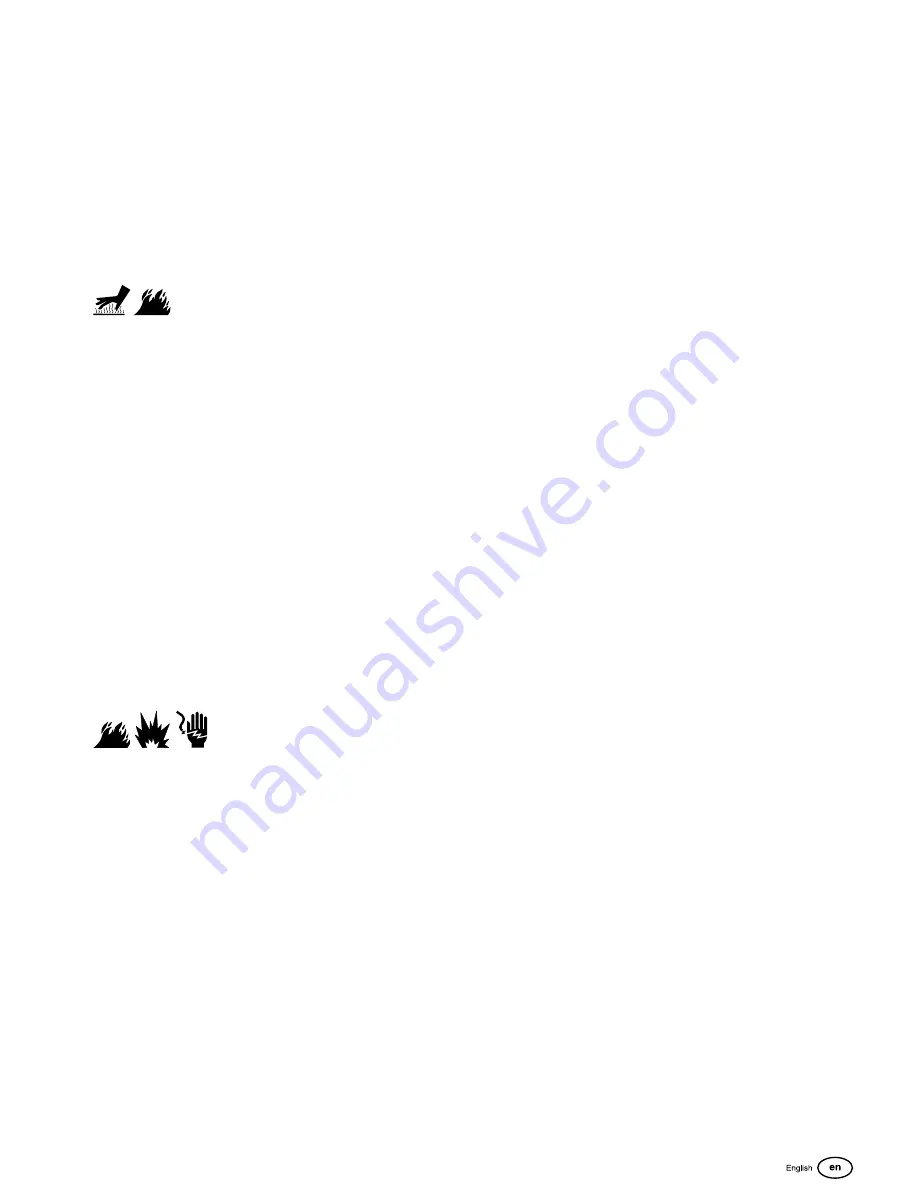
Paper Air Filter (with pre-cleaner)
1. Loosen the fastener(s) (A, Figure 14).
2. Remove the air filter cover (B, Figure 14).
3. Remove the filter (C, Figure 14) and the pre-cleaner (D), if installed.
4. To loosen unwanted material, lightly tap the filter on a hard surface. If the filter is
dirty, replace it with a new filter.
5. Clean the pre-cleaner (D, Figure 14), if installed, in liquid detergent and water. Let
the pre-cleaner fully air dry.
DO NOT
lubricate the pre-cleaner.
6. Assemble the dry pre-cleaner (D, Figure 14), if installed, and the filter (C) into the
air filter base (E).
7. Install the air filter cover (B, Figure 14) and attach with fastener(s) (A). Make sure
that the fastener(s) is tight.
Servicing the Cooling System
WARNING
During operation, the engine and muffler become hot. If you touch a hot engine,
thermal burns can occur.
Combustible debris, such as leaves, grass, and brush can catch fire.
•
Before you touch the engine or muffler, stop the engine and wait two (2)
minutes. Make sure that the engine and muffler are safe to touch.
•
Remove debris from the muffler and engine.
NOTICE
Do not use water to clean the engine. Water could cause contamination of the fuel
system. Use a brush or dry cloth to clean the engine.
This is an air cooled engine. Dirt or debris can prevent air flow and cause the engine to
become too hot and result in unsatisfactory performance and decreased engine life.
1. Use a brush or dry cloth to remove debris from the air intake grille.
2. Keep linkage, springs, and controls clean.
3. Keep the area around and behind the muffler, if equipped, free of combustible
debris.
4. Make sure the oil cooler fins, if equipped, are clean.
After a period of time, the cylinder cooling fins can collect debris and cause the engine
to overheat. This unwanted material cannot be removed without partial disassembly of
the engine. Have a Briggs & Stratton Authorized Service Dealer inspect and clean the
air cooling system as recommended in the
Maintenance Schedule
.
Storage
Fuel System
Refer to Figure: 15.
WARNING
Fuel and its vapors are flammable and explosive. Fire or explosion could result in
burns or death.
Fuel Storage
•
Because pilot lights or other ignition sources can cause explosions, keep fuel or
equipment away from furnaces, stoves, water heaters or other appliances that
have pilot lights.
Keep the engine level (normal operating position). Fill the fuel tank (A, Figure 15) with
fuel. For fuel expansion, do not fill above the fuel tank neck (B).
Fuel can become stale when kept in a storage container for more than 30 days. The use
of an alcohol-free fuel stabilizer and ethanol treatment in the fuel storage container is
recommended to prevent fuel degradation and keep the fuel fresh.
When you fill the fuel container with fuel, add an alcohol-free fuel stabilizer as specified
by the manufacturer’s instructions. If gasoline in the engine has not been treated with a
fuel stabilizer, it must be drained into an approved container. Operate the engine until it
is out of fuel.
Engine Oil
While the engine is still warm, change the engine oil. Refer to
Change the Engine Oil
section.
Troubleshooting
Assistance
For assistance, contact your local dealer or go to
BRIGGSandSTRATTON.COM
or call
1-800-444-7774
(in USA).
9
Not for
Reproduction






























